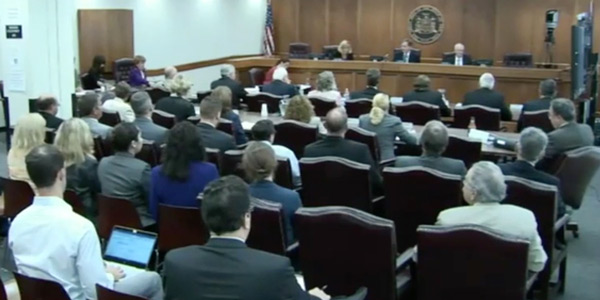By Michael Kuser
The New York Public Service Commission last week issued a procedural order to begin implementing its 2016 ruling prohibiting energy service companies (ESCOs) from enrolling new low-income customers and requiring them to unenroll existing ones.
While litigation had delayed execution of the December order, the state’s Appellate Division this month lifted a temporary restraining order and denied a stay on implementation sought by the National Energy Marketers Association, clearing the way for the commission to act.
The December order included 11 clauses establishing implementation deadlines and a waiver process for ESCOs seeking to offer low-income customers a guaranteed savings product. The more recent order revised the deadlines to account for time lost under the temporary restraining order. (See Court Blocks NYPSC Order Barring ESCO Contracts.)
“I think this order is extremely useful, it addresses any possibility for confusion and it brings clarity to the implementation and to the timing,” PSC Chair John Rhodes said during a Sept. 14 commission meeting. He was supported by commissioners Diane Burman, Gregg Sayre and James S. Alesi.
The commission’s general counsel, Paul Agresta, testified that the new order does not affect ESCOs that had filed for waivers consistent with the December order. “Those ESCOs do not need to de-enroll customers from their guaranteed savings products until the waivers are acted upon by the commission,” he said.
One Waiver Granted
Immediately after issuing the procedural order, the commission approved a petition for waiver from one ESCO (Ambit Energy), while denying two others (Drift Marketplace and M&R Energy Resources).
A petition must demonstrate the ESCO’s ability to calculate “what the customer would have paid the utility and to ensure that customers would be paying no more than they would have paid the utility, and appropriate reporting to demonstrate compliance with these assurances,” Bruce Alch, of the Department of Public Service (DPS) Office of Consumer Services, told the commission.
In helping to set the waiver procedures, the DPS Utility Intervention Unit (UIU) recommended that the commission deny any petitions that failed to meet that criteria and impose strict reporting requirements on any ESCO granted a waiver. Alch said the attorney general’s office and the Public Utility Law Project, a consumer advocacy group, both agreed with the UIU’s comments.
DPS staff recommended that the commission approve the petition for Ambit Energy to continue to serve low-income customers.
“Unlike the other ESCOs, the only product Ambit sells in New York state is a guaranteed savings product,” Alch said. “In support of its petition, Ambit provided models which replicate the utility tariffs and enable it to closely bill the customer what the utility would have billed the customer.”
Rhodes noted that “with this order, we also begin to lay out the standards for what it means to definitively establish the ability to provide guaranteed savings. That clarity is important, it’s helpful to the industry and it’s helpful to customers.”
Burman cast the only ‘no’ vote on all three waiver petitions, urging that the commission “take a step back.”
“The process has been confusing,” she said.
The commission directed ESCOs to block the enrollment of any new low-income customers on or before Sept. 22 and to unenroll customers within 30 days of receiving customer lists from the utilities.
NEMA on Friday filed comments protesting the PSC’s claim that ESCOs overcharge customers and cited data showing that they have saved New Yorkers more than $10 billion since 2002.
New VDER Compensation System
The commission last week also issued an order establishing a “value of distributed energy resources” (VDER) compensation system as a first step in moving beyond net energy metering. The new order grandfathers solar and other distributed energy systems installed before March 9, 2017, into the existing compensation scheme for the life of their operation.
Homeowners and small commercial customers that install solar or other small distributed systems between March 9, 2017, and Jan. 1, 2020, will be compensated through net metering for 20 years. All other systems installed after March 9 will be placed onto the new VDER compensation system after the utilities file final calculations and tariffs, which will take effect Nov. 1.
The commission in March adopted a new “value stack” pricing mechanism for solar and other DER, along with issuing two other orders to transition utilities into “distributed system platforms” and align their incentives with DER providers (Case NYPSC Adopts ‘Value Stack’ Rate Structure for DER.)
“This is a concrete first step that creates more active and more value-reflective pricing to spur development of those projects that are most valuable to the grid,” Rhodes said.
Last week’s order raises the maximum size of solar projects (from 2 MW to 5 MW) in order to decrease development costs and increase the competitiveness of the community solar market. It also establishes the first compensation values for energy storage systems when combined with eligible forms of DER and requires utilities to work with the state to integrate storage into the electric grid.
The commission anticipates considering final action early next year, following further analysis by utilities, stakeholders and DPS staff.








